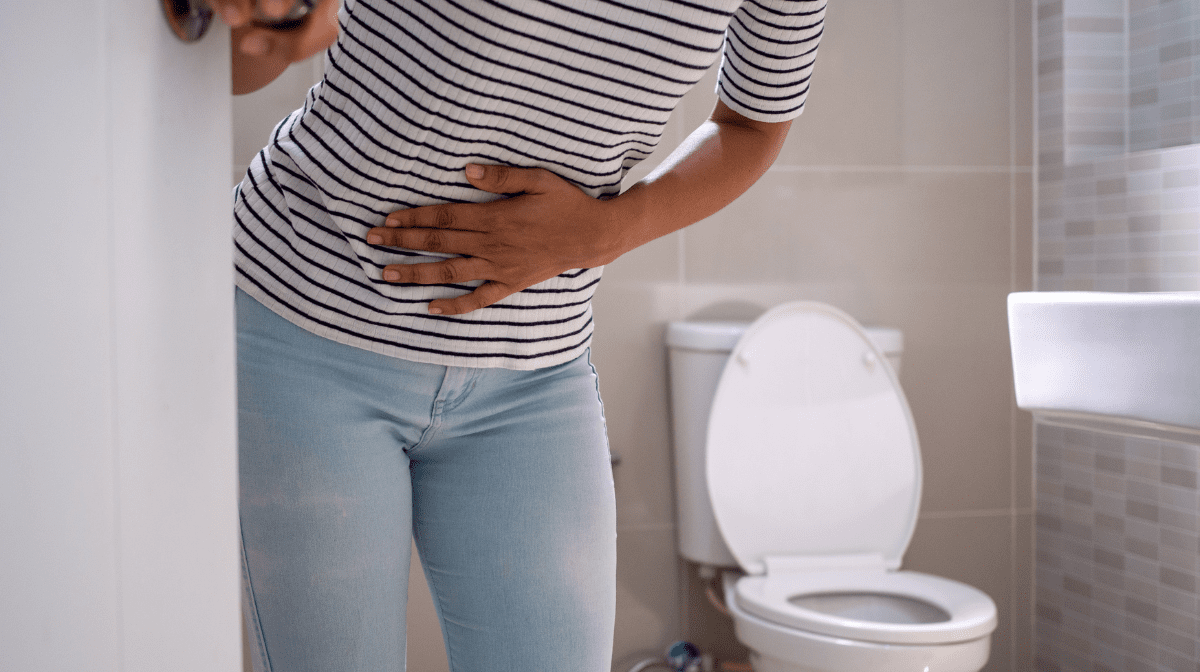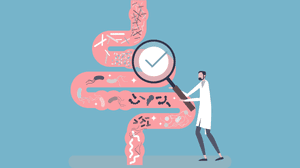Can Stress Really Cause Diarrhoea?
Diarrhoea. Nobody wants it, but all of us get it at one time or another. If we’re lucky, diarrhoea strikes when we’re in the comfort of our own home – with nobody around. But in other cases, we might be running for the toilet during a busy day at work, while we’re on a romantic holiday, or when we’re pumping iron at the gym.
Diarrhoea (or diarrhea, if you prefer its American English spelling) can be embarrassing, not to mention uncomfortable – and potentially accompanied by other symptoms such as cramping and abdominal pain. If we want to avoid this fate, we might be wondering: what causes diarrhoea? Food poisoning, food intolerances such as a dairy or gluten allergy, and medications with side effects can sometimes be to blame. But chronic diarrhoea affects many people too – and sometimes its triggers are hard to pin down. If this rings true for you: you may want to consider that stress could be causing diarrhoea for you.
Diarrhoea and dehydration
If you are experiencing diarrhoea, especially if it is accompanied by a fever, you should seek help from a medical professional. Acute diarrhoea can be treated with medications, or it may go away naturally by itself.
When you’re experiencing diarrhoea, your body is at risk of dehydration.[1] This is because an excess of fluids and electrolytes are lost from the body when you have a bowel movement. To avoid dehydration, make sure you are adding electrolytes back into your body by taking a rehydration electrolyte drink, which you can buy in a supermarket or pharmacy.
Stress versus anxiety: what are the differences?
Before considering stress as a potential diarrhoea cause, first you’ll want to understand what stress really is. Stress and anxiety are related, but it’s important to understand the major differences.
Stress is usually a response to a trigger such as an unstable financial situation, poor health, work and study deadlines, or a difficult time at home. Anxiety, however, is defined by the American Psychological Association as: “persistent, excessive worries that don’t go away even in the absence of a stressor.”[2] So, even when life is going well on paper, with anxiety, you may still suffer from mental symptoms such as worried or invasive thoughts; and physical symptoms such as feeling butterflies in your stomach.
Both anxiety and stress can be associated with adverse digestive symptoms such as diarrhoea[3], cramping, and abdominal pain.[4]
The connection between stress and the gut
Did you know that the negative emotions we experience can have directly harmful effects on our gut?[5] This phenomenon is explained by the presence of what is known as the gut-brain axis: a complex pathway in the body which allows communication to happen between the gut and the brain.[6] A stressful day at work, nerves before a big event, or even feelings of sadness can register as abdominal pain, diarrhoea, or cramps. Chronic anxiety can also make preexisting digestive issues worse, such as irritable bowel syndrome and stomach ulcers.[7]
When a body is under stress, it also produces more cortisol.[8] Energy normally devoted to digestion is diverted away to the extremities, which, evolutionarily, helped us to get away from predators or foes faster. Physical symptoms of this stress response include slowed digestion, rapid expulsion of the gut’s contents as is the case for diarrhoea, muscle spasms, and decreased acidity in the gut.[9]
Your gut microbiome on stress
Every person’s gut is home to a plethora of non-human microorganisms, which not only help with digestive processes, but also protect us against pathogens.[10] As a whole, the ecosystem of living microorganisms in the gut is referred to as the gut microbiome.
Back to the gut-brain axis for a minute. Did you know that the gut microbiome also communicates with the brain through the gut-brain axis?[11]
People who suffer from chronic stress tend to have a less diverse microbiome than healthy individuals.[12]
Stress has also been associated with dysbiosis[13], which is the phenomenon where your gut microbiome is ‘out of balance.’ The balance refers to the proportion of good bacteria to bad bacteria, as well as the presence of different strands of bacterial species, which may play different roles in gut health. A gut microbiome where ‘bad’ bacteria has built up leaves less room for the good kind that help our body in numerous ways.
Dysbiosis has been linked to chronic fatigue, acne, and allergies in numerous studies.[14] There is a notable link between dysbiosis and anxiety, too.[15]
How to manage Diarrhoea at home
If diarrhoea is stopping you from doing the things you love, you’ll be glad to know there are plenty of ways to manage it.
First of all, if the diarrhoea is a new problem, or getting worse, seek advice from a medical professional first to rule out any serious issues that may be causing it, like a food intolerance or a major illness.
If you have chronic diarrhoea due to, for example, irritable bowel syndrome or IBS, your doctor may suggest ways of managing it in daily life.
Try a low FODMAP diet
Doctors and nutritionists often suggest trying the low FODMAP diet for people who suffer from diarrhoea regularly. This diet’s central philosophy is that foods high in FODMAPs, Fermentable Oligosaccharides, Disaccharides, Monosaccharides And Polyols, are not easily absorbed in the small intestine, which can increase the level of gas and fluid in the bowel and lead to uncomfortable digestive symptoms.
Take probiotic supplements
Maintaining the presence of good gut bacteria, and avoiding dysbiosis, are very important to our mental and physical health; as mentioned earlier, dysbiosis and an unhealthy gut microbiome have been associated with diarrhoea, anxiety, and stress.
There are a number of ways to support good gut bacteria, including eating a balanced diet and getting plenty of exercise. Taking a probiotic supplement on top of these can help to support your gut health too. Try Alflorex®, which is specially formulated to support a healthy gut. Or opt for Zenflore®, which is a probiotic intended to not only support gut function, but to support mental wellness too.
Therapy
If you suspect that stress or anxiety are causing diarrhoea for you, you may want to look at managing those first. Therapy is a common and effective treatment for stress and anxiety. There are different types of therapies that can be used to treat anxiety disorders, including Cognitive Behavioural Therapy (CBT). CBT is a type of talk therapy, where a therapist can help you to identify and modify the negative patterns of thinking and behaviour that could be contributing to your stress and anxiety.[16]
Medications
When therapy and other treatments aren’t effective, medication may be prescribed for anxiety. These medications can help reduce symptoms of anxiety, including panic attacks, shortness of breath, and irritability.[17] It's essential to work with a healthcare provider to determine if medication is the best option for you and to monitor any potential side effects.
On the other hand, you can also speak to your doctor about medications for diarrhoea such as Bismuth subsalicylate[18] or Loperamide[19].
Lifestyle changes
Removing a major source of stress can help you to live a more well-rounded and healthy life. But it can also potentially help you manage diarrhoea – if stress is the route cause. Changing to a different job, ending or setting new boundaries in a difficult relationship, or asking a friend or family member for help with your problems can help to relieve stress.
Eliminate other potential diarrhoea causes
Diarrhoea can arise due to a myriad of factors, which can make it difficult to address. If you’ve been to a doctor and everything is clear, you may want to try experimenting with some lifestyle, diet, and other changes to figure out the root cause.
Switching to a new medication, travelling to a foreign country, or even antibiotic use may cause diarrhoea.[20] In these sometimes necessary and unavoidable circumstances, taking a probiotic supplement can help to support gut health.
Sources:
[1] https://www.healthdirect.gov.au/diarrhoea#:~:text=Diarrhoea%20may%20cause%20dehydration.,why%20rehydration%20is%20so%20important.
[2] https://www.apa.org/topics/stress/anxiety-difference
[3] https://www.mayoclinic.org/diseases-conditions/anxiety/symptoms-causes/syc-20350961
[4] https://www.uchicagomedicine.org/forefront/gastrointestinal-articles/stress-and-stomach-pain-when-should-you-see-a-specialist#:~:text=When%20we're%20stressed%2C%20hormones,our%20gut%2C%20causing%20GI%20discomfort.
[5] https://www.health.harvard.edu/diseases-and-conditions/the-gut-brain-connection
[6] https://www.ncbi.nlm.nih.gov/pmc/articles/PMC4367209/#:~:text=The%20gut%2Dbrain%20axis%20(GBA,microbiota%20in%20influencing%20these%20interactions.
[7] https://www.nhs.uk/live-well/eat-well/digestive-health/five-lifestyle-tips-for-a-healthy-tummy/#:~:text=In%20some%20people%2C%20stress%20slows,ulcers%20and%20irritable%20bowel%20syndrome.
[8] https://atlasbiomed.com/blog/how-stress-impacts-the-gut-via-the-gut-brain-axis/
[9] https://atlasbiomed.com/blog/how-stress-impacts-the-gut-via-the-gut-brain-axis/
[10] https://my.clevelandclinic.org/health/articles/14598-probiotics
[11] https://www.ncbi.nlm.nih.gov/pmc/articles/PMC4367209/#:~:text=The%20gut%2Dbrain%20axis%20(GBA,microbiota%20in%20influencing%20these%20interactions.
[12] https://atlasbiomed.com/blog/how-stress-impacts-the-gut-via-the-gut-brain-axis/
[13] https://www.ncbi.nlm.nih.gov/pmc/articles/PMC8837476/
[14] https://www.health.harvard.edu/blog/leaky-gut-what-is-it-and-what-does-it-mean-for-you-2017092212451
[15] https://www.ncbi.nlm.nih.gov/pmc/articles/PMC4367209/#:~:text=The%20gut%2Dbrain%20axis%20(GBA,microbiota%20in%20influencing%20these%20interactions.
[16] https://www.mayoclinic.org/tests-procedures/cognitive-behavioral-therapy/about/pac-20384610
[17] https://www.nhs.uk/mental-health/conditions/generalised-anxiety-disorder/treatment/
[18] https://www.medicalnewstoday.com/articles/best-medication-for-diarrhea#prescription
[19] https://www.nhs.uk/medicines/loperamide/#:~:text=Loperamide%20is%20a%20medicine%20to,colitis%20and%20short%20bowel%20syndrome.
[20] https://www.mayoclinic.org/diseases-conditions/antibiotic-associated-diarrhea/symptoms-causes/syc-20352231
Just noting that the suggested title and keywords seem to be based on the wrong spelling, which I have used throughout







